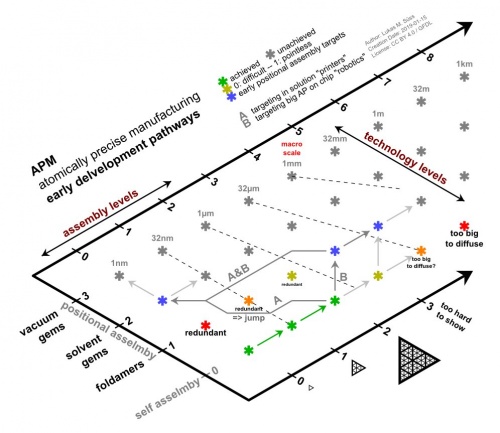Difference between revisions of "Foldamer robot approach (incremental path)"
From apm
m |
(added some minimal elucidation) |
||
| Line 16: | Line 16: | ||
* [[top down positional assembly]] became possible. | * [[top down positional assembly]] became possible. | ||
| − | + | The robo approach in the incremental path basically entails <br> | |
| + | compared to [[diamoindoid]] low performance de-novo protein and other foldamer based productive nanosystems<br> | ||
| + | at larger but not necessarily macro-scales. | ||
== Applications == | == Applications == | ||
Revision as of 09:36, 19 June 2023

Possible map for the incremental path. The robo approach corresponds to path B in the diagram.
This is about a possible sub-branch of the incremental path.
The idea here is to scale up self-assembly capabilities of various foldamer technologies quite far (yellow or orange "too big to diffuse?" star in the diagram). And only then take a turn left in the diagram to more advanced materials.
Path marked with B in the diagram.
How would that look like in reality?
There would be quite advanced bottom up-self assembled foldamer based systems on chip.
Perhaps so far so that
- bottom up positional assembly has already been reached and
- top down positional assembly became possible.
The robo approach in the incremental path basically entails
compared to diamoindoid low performance de-novo protein and other foldamer based productive nanosystems
at larger but not necessarily macro-scales.
Applications
This could e.g. make quite big structures usable for:
- bigger gratings for neutral atom helium matter wave microscopes
- much bigger optical gratings like on butterfly wings (structural color)
- ...
Related
- Turn left here: Robo approach
- Turn left earlier: Printer approach
- Turn left earliest: Catalysis construction kit approach
- For something similar but in the context of the direct path see:
RepRec pick-and-place robots (GemGum)